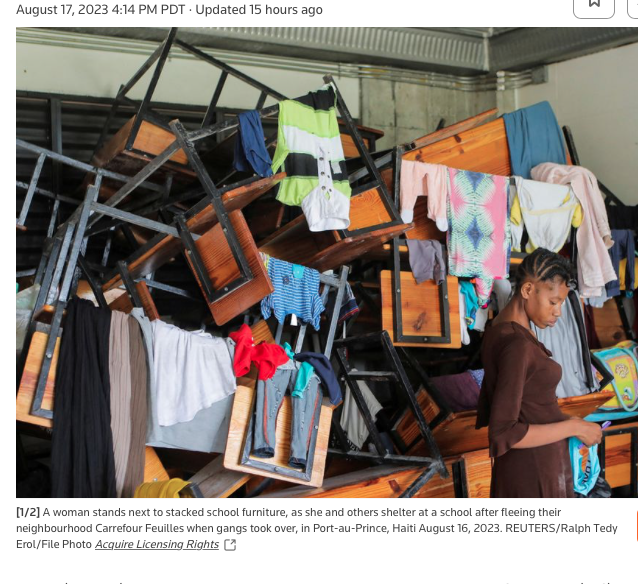Aug 17 (Reuters) – Haitian aid groups backed by the International Rescue Committee (IRC) are temporarily shutting down operations, including some mobile health clinics, following days of extreme violence in parts of the Caribbean nation’s capital Port-au-Prince.
“In a matter of days, violence escalated dramatically in Port-au-Prince, particularly affecting neighborhoods where the IRC collaborates with local organizations to provide vital services,” the aid group said on Thursday.
The IRC launched its Haiti response plan last December and works with a number of local groups around the capital, where much of the violence has taken place.
Ann Lee, co-founder of U.S.-based crisis response group CORE, which is still operating in Haiti, said many aid groups had left as costs rise, financial aid dwindles and staff operates under increasingly life-threatening conditions.
“We have a staff member who lost her daughter because she was having a seizure and couldn’t get to the hospital,” she said. “We have an employee whose brother was beheaded.”
Lee said there was not a single member of CORE’s 100-person Haiti team who did not know a victim of the violence.
Since Saturday, the United Nations estimates nearly 5,000 people have fled their homes from areas around Savages Pistaches Carrefour Feuilles, which has been besieged by the Grand Ravine gang.
In a statement, Haiti’s government said police would deploy “all its forces” to restore order to Carrefour Feuilles.
Haiti’s under-gunned police have struggled against heavily armed gangs who have dramatically expanded their territory since last year, with their turf wars driving mass displacements, severe food shortages, murders, kidnappings and sexual violence.
Last October, Haiti’s government called for foreign security assistance but this went unanswered until Kenya stepped up last month. Many nations are wary of lending support to Prime Minister Ariel Henry’s unelected government, considered by many Haitians to be corrupt.
Following a ground assessment in coming weeks, a U.N.-backed plan to send a multinational security force should go to a vote at the U.N. Security Council.
The IRC said that even where its partner organizations were working to continue providing services, roadblocks installed by warring gangs were preventing residents from accessing them.
Recalling driving around Port-au-Prince and seeing bodies line the streets, Lee said she supported a Kenyan force but this would not solve the root problems.
“The level of violence is unprecedented,” she said.
Reporting by Sarah Morland; Editing by Josie Kao and Lincoln Feast
